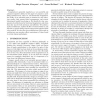725 search results - page 89 / 145 » Learning Behaviors Models for Robot Execution Control |
CSL
2007
Springer
2007
Springer
Speaker-adaptive learning of resonance targets in a hidden trajectory model of speech coarticulation
13 years 8 months ago
A novel speaker-adaptive learning algorithm is developed and evaluated for a hidden trajectory model of speech coarticulation and reduction. Central to this model is the process o...
RAS
2010
13 years 7 months ago
2010
This paper presents a model of ocular-motor development, inspired by ideas and data from developmental psychology. The learning problem concerns the growth of the transform betwee...
ICRA
2007
IEEE
14 years 3 months ago
2007
IEEE
— Most robotic vision algorithms are proposed by envisaging robots operating in structured environments where the world is assumed to be rigid. These algorithms fail to provide o...
AISB
2008
Springer
13 years 10 months ago
2008
Springer
Imagination is generally regarded as a very powerful and advanced cognitive ability. In this paper we propose a modelling framework for what we call functional imagination: the ab...
FIW
2007
13 years 10 months ago
2007
Feature interaction detection methods, whether online or offline, depend on previous knowledge of conflicts between the actions executed by the features. This knowledge is usually ...

